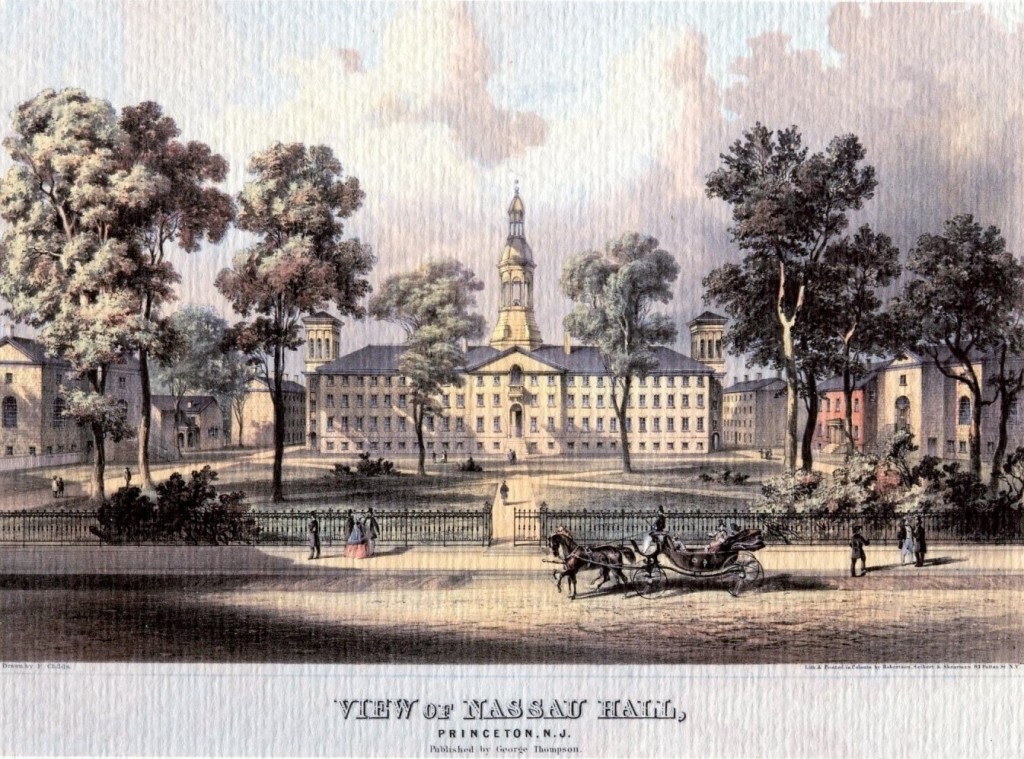-
This Week in Princeton History for February 20-26

In this week’s installment of our recurring series, a new student publication appears, Japanese students are remembered, and more. February 20, 1840—The first issue of a new student magazine, The Gem from Nassau’s Casket, appears. Though it will be short-lived, its successor publication, the Nassau Literary Magazine, will achieve a longstanding place on campus.
-
This Week in Princeton History for February 13-19
In this week’s installment of our recurring series, a professor attempts to calm local protests, students are arrested after defacing buildings in Trenton and Lawrenceville, and more. February 13, 1911—Louis Meyer, a Presbyterian who was raised Jewish, lectures to a large group of Princetonians in McCosh Hall’s East Room, which seats 600. As one of…
-
This Week in Princeton History for February 6-12

In this week’s installment of our recurring series, students request that their grades not be shared publicly, a writer cites a Princeton president to bolster an argument against dancing, and more. February 6, 1879—Students ask that the College cease the custom of printing their grades for public review, on the basis that it is embarrassing…
-
This Week in Princeton History for January 30-February 5

In this week’s installment of our recurring series, students send egg rolls to a celebrity, an agricultural program is proposed, and more. January 30, 1898—Princeton president Francis Patton urges students to join the Temperance Movement and accept college rules against drinking, even if their own consciences would permit them to drink. I should be exceedingly…
-
This Week in Princeton History for January 23-29

In this week’s installment of our recurring series, Princeton seeks to build housing for married students, locals consider the merits of slavery in the South, and more. January 23, 1946—Princeton University requests an amendment to local zoning regulations in order to build a “garden-type housing project” to accommodate 150 to 170 families. The proposed housing will…
-
This Week in Princeton History for January 16-22

In this week’s installment of our recurring series, students have a reputation for misbehavior, people claiming to be Nigerian royalty seek pen pals, and more. January 17, 1882—The New Orleans Times-Picayune reports, “The Princeton students seem to have recommenced the disgraceful rowdyism which brought the college into such disrepute some time since,” saying that just…
-
This Week in Princeton History for January 9-15
In this week’s installment of our recurring series, a student expresses concern about staff wages, faculty warn seniors that they have to attend classes, and more. January 11, 1889—A student writes in a letter to the editor of the Daily Princetonian about his concerns about dorm fees not being used to pay staff appropriately. With…
-
This Week in Princeton History for January 2-8

In this week’s installment of our recurring series, Princeton’s colors are on display at a party in New Orleans, a student is unimpressed with a future movie classic, and more. January 4, 1891—The New Orleans Times-Picayune reports that at a recent New Year’s Eve party thrown by Pearl Wright for her son, Ira, and his…
-
This Week in Princeton History for December 26-January 1

In this week’s installment of our recurring series, immigrants are required to be fingerprinted, faculty are investigating mysterious explosions, and more. December 26, 1940—Under the recently passed federal law known as the Alien Registration Act, all local non-citizens must complete registration with the Princeton post office by this date. All will fill out five forms…
-
This Week in Princeton History for December 19-25
In this week’s installment of our recurring series, alumni have the chance to see proposed dormitory plans, a student plot to make eggnog is foiled, and more. December 22, 1890—The Charlotte News notes that “A large number of Princeton students passed the city yesterday en route south.” December 23, 1908—Today’s issue of the Princeton Alumni…
Princeton University Library
University Archives
